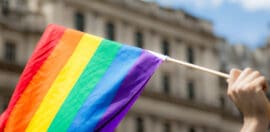Playing ball

20 February 2023 at 3:13 pm
Some sporting clubs are showing how working with community can result in more effective inclusivity for LGBITQ+ players.
Significant progress has been made to build more inclusive rules and practices in sport, and as a result, sporting cultures are evolving towards more considered acceptance and inclusion of LGBTIQA+ communities and players.
Important lessons can be learned from the 18-month journey and consultation process undertaken by Pride Cup and the A-League, Australia’s and New Zealand’s highest-level professional soccer league, which recently announced that it will hold its inaugural pride celebration later this month.
What makes this different from other pride initiatives is the approach of being a player-driven, opt-in effort that will see two clubs wear dedicated pride jerseys, others with rainbow-coloured numbers on their backs, optional rainbow armbands for captains, and home teams with rainbow corner flags alongside digital and physical signage.
The Professional Footballers Australia, the players’ union, has also been heavily involved in consulting with players to avoid situations like the one that occurred at the Manly Sea Eagles last year, when the National Rugby League club went on to apologise for its “poor” execution in unveiling a pride jersey, which was subsequently boycotted by several players on religious and cultural grounds.
Many sporting codes are on the journey to understand and prioritise inclusion, diversity, and visible displays of allyship. According to new research published, sporting teams who participate in pride games use approximately 40 percent less homophobic language than teams that do not. The Monash University study is the first of its type to assess the effects of pride games, initiatives, and rounds on homophobic discourse in sport.
ince the National Hockey League’s Florida Panthers hosted the inaugural LGBT pride game in 2013, the events have been embraced by all National Hockey Teams teams, all Major League Baseball teams, numerous NFL/NBA teams, and teams and leagues worldwide.
The work with the A-League has highlighted a specific aim; to reduce the use of homophobic language within sporting environments accompanied by an education and training program intended to help stamp out homophobic attitudes from the game. Language has tremendous power and is a driving force in the development of more inclusive sporting environments for all people.
The impacts of this language are frequently passed unnoticed as “part of the game,” despite being identified as a serious issue to the inclusion and retention of LGBTIQA+ people in clubs. Homophobic, transphobic, and other bigoted terminology in sport is harmful to LGBTIQA+ people’s mental and physical health and reinforces attitudes that LGBTIQA+ sporting organisations are working to challenge and eliminate.
Despite the barriers that exist to LGBTIQA+ engaging with movement and sport, participating in sport has many benefits which include: the benefits of physical health, with sport providing an opportunity to engage with an active lifestyle, reduce stress, and improve physical fitness.
Sport can also provide a positive outlet for mental and emotional stress in a positive environment where different needs are considered. It can also provide a sense of community and belonging, allowing folks to connect with others in their communities.
By participating in sport, LGBTIQA+ individuals can help to break down barriers and promote inclusivity in sporting communities. This can lead to greater acceptance and understanding, and help to make sport more welcoming for everyone.
At an elite international level, the most recent Australian Open celebrated its second Pride Round as part of its goal to create the world’s largest Pride event in sport and entertainment. The Australian Open has always taken pride in being an innovative slam and an event open to all. The tournament was able to showcase its values, celebrate LGBTIQA+ diversity, and promote an inclusive and safe sporting environment through the Pride Round, Glam Slam, and Pride 365.
Lessons can be drawn from how the social services sector approaches the challenge of creating workplaces that are truly inclusive of LGBTIQA+ people, supported by ongoing education and training to create safe and inclusive environments that foster all people regardless of their background or identity.







